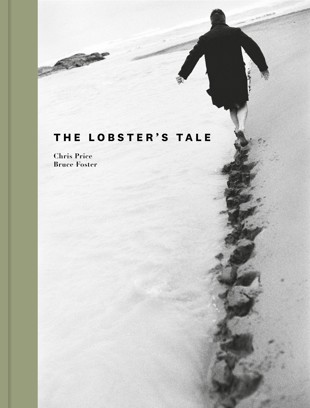Paula Green reviews The Lobster's Tale and author Chris Price reads from the book:
Lloyd Jones’ Kōrero series invites a collaboration between ‘two different kinds of artist intelligence’ on a specific topic. The first two books were a triumph of image, text and design: Lloyd Jones and Euan Macleod (High Wire); Paula Morris and Haru Sameshima (Shining Land). The third book The Lobster’s Tale brings together photographer Bruce Foster and writer Chris Price. A sentence threads along the bottom of the page, there are Bruce’s photographs and there is Chris’s text. The photographs track sky water land, imprints of existence. The paragraphs draw upon multiple voices that also navigate questions of being. The final and fascinating leg of the journey is the conversation that emanates from photographs, text and sentence thread.
The sentence thread running along the bottom of the pages, is described by Chris as a paragraph, a ribbon. A paragraph ribbon that is a poetic and fascinating accretion. An at-times borrowed thread that draws upon the words of Ursula LeGuin and William Beebe. As you turn the page, the paper rustle breaks into the stream of reading, a tiny rupture, visually and aurally. Which is how I read the book as a whole. Ideas arrive and I pause. The thread is an itinerary, full of pit stops and bridges and, as with any voyage, I can only hold it in pieces. I grasp the damaged earth, weather, diverse terrain, the air we breathe, definable time, indefinable time.
I travel with the paragraphs next, and each paragraph, reminiscent of poetry, expands in generous frames of white space. The writing is both intricate and plain. Complex issues of ‘being’ come to the foreground. ‘Being’ becomes notated existence, whether lobster or human, whether voyage or longing, repleteness or hunger, plunder or plenitude. Suicide is a linking echo. Albert Camus, Tupaia, Jonathan Franzan, Ursula Le Guin, David Foster Wallace, among others, make appearances. Yes, lobster is a starting point, from which reading and research radiate. Fascinating lobster facts and anecdotes reside alongside philosophical nuggets. I am attracted to these nuggets gleaming in the oceanic dark, like landmarks on my voyage into the unknown. The writing is both of and beyond the lobster. The writing is a means of becoming. ‘A profound thought,’ says Camus, ‘is in a constant state of becoming’.
Read the full review and listen to the audio here.


